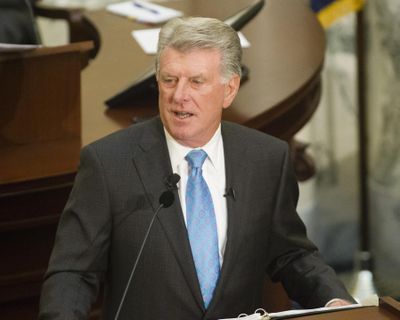Review shows Otter has achieved $1 billion in tax cuts

BOISE – Gov. Butch Otter said he has lowered the tax burden for Idaho residents by roughly $1 billion during his 11-year tenure, and an Associated Press review shows the numbers added up.
Otter announced his tax-cutting accomplishments during his annual State of the State address Jan. 9 to lawmakers and other elected officials. Otter’s staff later provided the AP with more detailed information on the tax relief he approved from fiscal year 2008 through fiscal year 2017.
The popular grocery tax credit created the biggest savings, providing a combined $633 million in relief since it began in 2008. The next biggest tax-relief measure has been cutting individual and corporate tax rates, which has resulted in a combined $213.4 million in tax relief over the past 10 years. Additional sales tax exemptions and business incentives made up the rest to reach about $1 billion.
This year, the Republican governor is not requesting that the Idaho Legislature pass a tax cut, but he says he is open to approving one if it comes to his desk.
“I am as committed as ever to limiting the size and growth of our state government, and we continue to make many of the efficiencies realized during the Great Recession a part of our standard operations,” Otter told lawmakers. “But I also understand the costs of failing to invest prudently and sustainably in our future.”
The governor’s first years in office came during the height of the Great Recession, where state dollars were few and tax cuts were scarce. Not until the past five years did Otter approve the bulk of the state’s tax relief.
In fiscal 2008, Otter approved $19 million in tax relief, made up solely on the first year of the grocery tax credit. The popular program allows every Idaho resident to receive a $100 tax credit, or $120 for those over 65, to help pay sales tax on groceries.
Past attempts to remove the credit have failed, even with the promise of ending sales tax on food. The nonpartisan Idaho Center for Fiscal Policy released a report in 2015 estimating that ending the grocery tax would result in an average $52 reduction for middle-income households, but the poorest households would likely end up paying slightly more taxes.
Otter has signed 26 additional tax-relief laws over the past 10 years. By fiscal 2016, tax relief reached almost $200 million through lower individual and corporate tax rates, new sales tax exemptions and more.
With state budget writers expected to see a surplus at the end of the fiscal year, lawmakers must decide whether to place the funds in the state’s savings accounts – which have still not reached pre-recession levels – or cut taxes, Republican House Speaker Scott Bedke has said.
It’s still unknown what, if any, tax cuts will survive both chambers before heading to the governor’s desk.